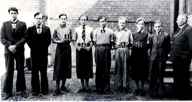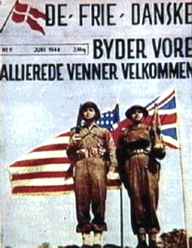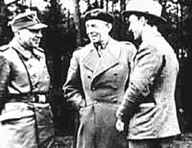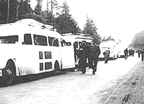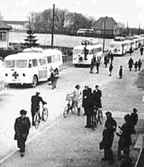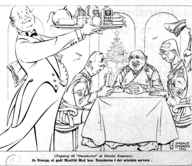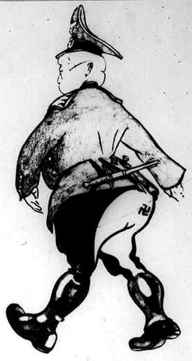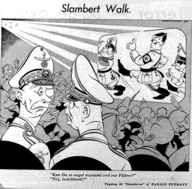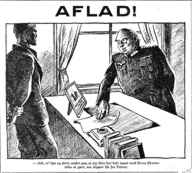Background: Prior to WWII Denmark was a small independent state which had the misfortune to be situated next to Germany. Denmark had a long history of being neutral. A policy which kept the country out of WWI. Denmark is a very small country and it had no political or military importance except for one: When Hitler planned to occupy Norway to secure the supply of iron ore and hence keep it from the British, Denmark was in the way. In the northern part of Denmark is the city of Aalborg (my home town) and right outside is a large air field. This air field was crucial since it was the only place the Luftwaffe could operate from when they invaded Norway. Therefore the Denmark occupation. A bit of family history On the morning of the 9th of April 1940 my grandfather was taking my mother to school. She was 7 at the time and had just started school. She told me that on the way to school they heard and saw many German bomber planes circling over the city. Leaflets was dropped all over, and in very poor Danish the civilian population was told to keep quiet so the German bombers didn't have to do to Danish cities what they had done to Polish cities. My mother remembered how she took a good grip at her fathers very large hand and asked what that all meant. My grandfather was a mason and a very large man. My mother was surprised how frighten he became (he never needed to fear anybody). He told her that we were at war but it would be all right. She did not believe him since he also was afraid. At the same time the Germans landed paratroopers in the city center. They were dropped in order to secure a vital bridge across a fjord that is still running through the city of Aalborg. The airfield was on the other side of the fjord. This parachute drop is, as far as I know, the first during the war. It was rather small and not nearly as famous as Crete. In other places the Danish army (very
small and equipped with WWI weapons) took up the fight but it was
no match for the battle hardened German troops. The most casualties
was taken protecting the King in his castle. Because of the German bombers hanging over the cities ready to turn them in to a Warsaw, the government and the King decided to give up. The same day, it was declared that the German forces would work together with the Danish government to keep peace. The government, in effect, started to work together with the Germans! Over the summer of 1940 it became clear that Hitler would probable win the war, and the policy of cooperation looked as if it was a good idea. The only problem was that the Danish people did not agree. We could not fight the Germans outright but we could show them who's side we were on. During the time of the battle of Britain young people started to wear a new kind of hat fashioned after the red, white and blue markings on the RAF planes. It came overnight and was very popular until the Germans outlawed them. Also the famous V sign was all over as was the name of Churchill. Written on walls, fences and even on the local German army barracks.
in the schools chemistry shop. It did not work! So they stole German
supplies and guns, and blew up a few trucks and barracks. It did
not give the Germans much trouble and the guys were soon caught
and put in prison. They were put in the local prison and had a good
time. One should think that the sabotage would stop there, but they
managed to loosen two of the iron bars in the window and that way
they could sneak out during the night at continue the work. In the
morning they would be back in bed. What better alibi? After about
a month the Germans caught one of the guys and the trick with the
window was found out. They were transported to a more secure location
after that. Again on a personal note, my granddad became an active member of the resistance. Meaning that he did partake in sabotage actions both at the above mentioned airfield and on the railways. Denmark was to the Germans known as"the whipped cream front" because the chances of getting killed was much smaller than on the eastern front, and there was enough food. Denmark became in effect the bread basket for Germany. Therefore was disruption of the rail lines vital.
The Jews In Denmark there was about 7.000
Jews in 1940. Of course they didn't enjoy the prospect of having the
Germans here but nobody really believed that anything really bad would
happen. In Denmark the Jews were an integrated part of the population.
They were not orthodox and they dressed normally. In fact nobody ever
thought about people as Jews. They were just Danes. Admiral Canaris of the Abwehr (German
Intelligence) leaked from time to time information to the Danish ambassador
to Berlin and, in this way, it was known a few days in advance that
the Jews. was going to be taken. This information was passed on to
the resistance and a massive rescue mission was organized. The amazing
thing is that it was ordinary people who came to the rescue. It did
not matter who it was. It was a fellow Dane in need and the people
rose to the occasion. It was not only the resistance who did the work,
It was ordinary people who wanted to make a difference. The end of the war Early in 1945 the world was almost coming to an end. The allies was crushing Germany, and the Germans in Denmark became very worried. The started to shoot people more often and was in general trigger happy. Many a Dane was killed that way. Especially the troops on R and R from the eastern front shot many. They were used to people trying to kill them so they shot first and asked questions later. My father who was 14 at the time almost got killed because he wanted to tug his scarf into his jacket. Some soldiers thought that he was reaching after a grenade and almost shot him. He had to open his jacket very slowly so they could see that he was unarmed. They were SS on leave from Russia. At the end it was normal when the resistance held up Germans in the streets during the day and took their weapons, so the resistance more or less ruled the streets, and then on the 4 of May the news came from London that the Germans had surrendered to Montgomery. People ripped down the blackout curtains and burned them in the streets. Informers and girls who had German boyfriends was rounded up and given what people meant they had coming. Also a lot of private scores was settled at that time. Not our finest hour. After the war the Russians occupied one of our islands for almost a year. That helped the Danes to turn firmly to the Western allies. Not that there was ever any doubt who our friends were, but this just showed that we were right. Even today almost 60 years
later the Danes are deeply grateful for the help we received from
the United States and Britain. We feel a deep friendship with the
two nations and support where ever we can. The friendship is so strong
that Denmark every year celebrate your independence day the 4th of
July. I know of no other country that does that. The celebration takes
place just outside my hometown of Aalborg, where there is a big party.
Our Queen and our Prime Minister always attend. The American ambassador
is also there and, over the years, three former American presidents
has spoken there. Then, of course there a 20-50.000 people to help
make it a good day. The US Navy every year sends a vessel to visit
Aalborg and the US Air Force is there too. War News and Propaganda Here are a few examples of what was in the illegal papers besides war news and propaganda
|
|
Visitors since
June 6, 2000 |

